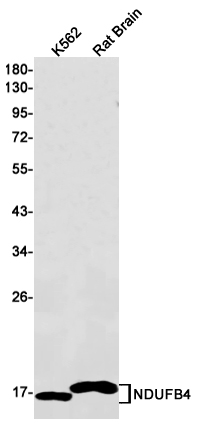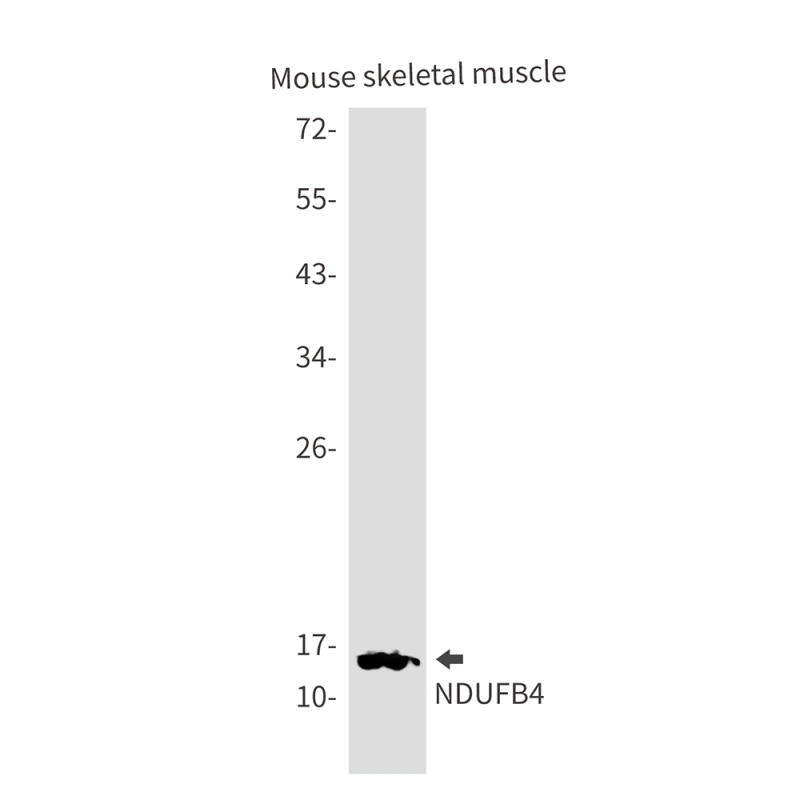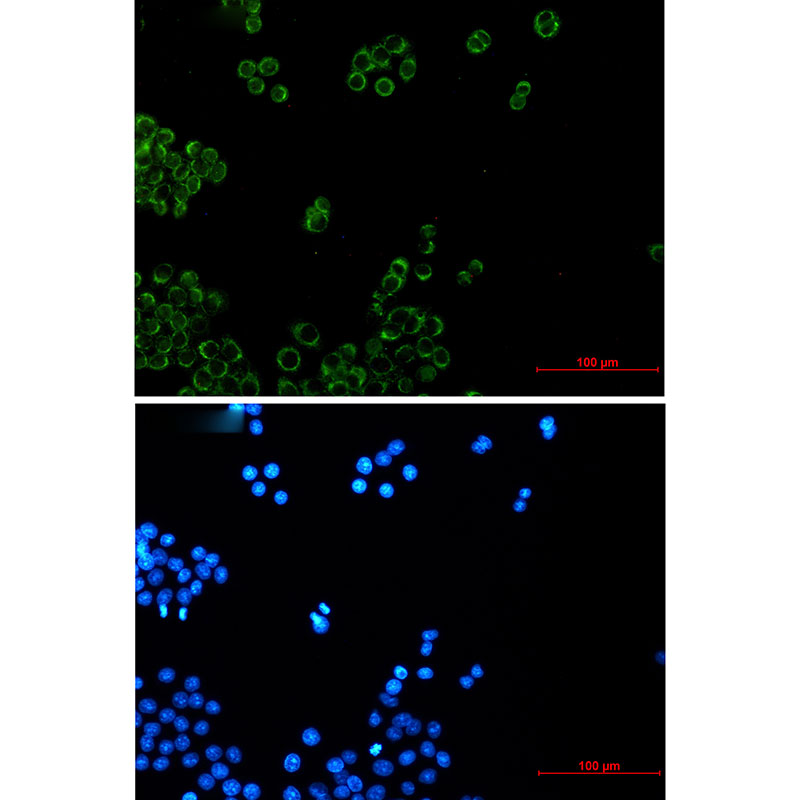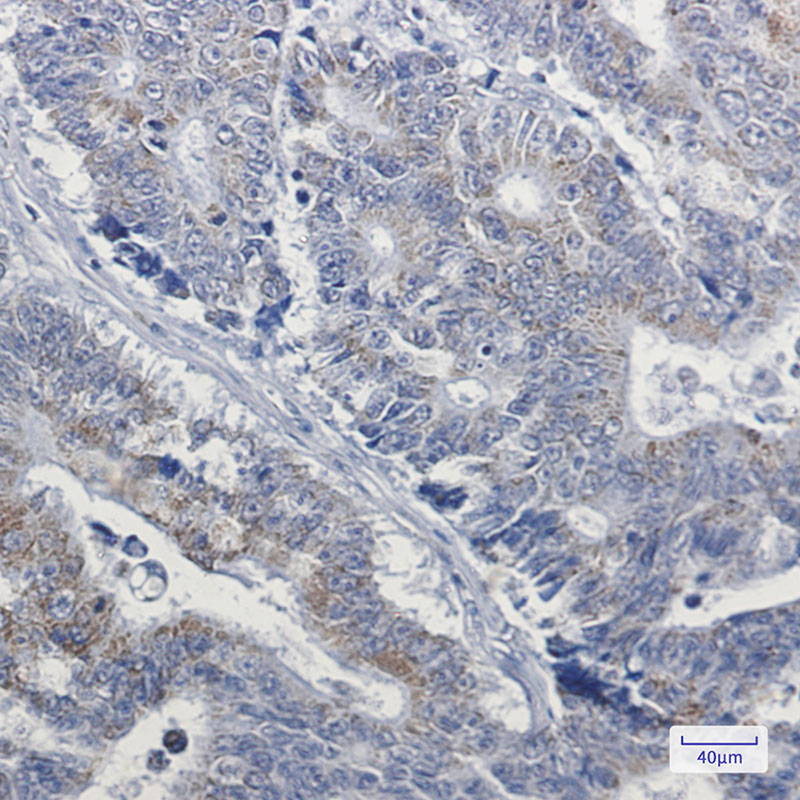



| WB | 1/500-1/1000 | Human,Mouse,Rat |
| IF | 咨询技术 | Human,Mouse,Rat |
| IHC | 1/50-1/100 | Human,Mouse,Rat |
| ICC | 1/50-1/200 | Human,Mouse,Rat |
| FCM | 咨询技术 | Human,Mouse,Rat |
| Elisa | 咨询技术 | Human,Mouse,Rat |
| Aliases | B15; CI-B15 |
| Entrez GeneID | 4710 |
| WB Predicted band size | Calculated MW: 15 kDa; Observed MW: 15 kDa |
| Host/Isotype | Rabbit IgG |
| Antibody Type | Primary antibody |
| Storage | Store at 4°C short term. Aliquot and store at -20°C long term. Avoid freeze/thaw cycles. |
| Species Reactivity | Human,Mouse,Rat |
| Immunogen | Recombinant protein of human NDUFB4 |
| Formulation | Purified antibody in TBS with 0.05% sodium azide,0.05%BSA and 50% glycerol. |
+ +
以下是关于NDUFB4抗体的3篇参考文献示例(注:以下内容为模拟生成,实际文献需通过学术数据库查询):
---
1. **文献名称**:*Mitochondrial complex I deficiency in Parkinson’s disease identified by antibody-based proteomic analysis*
**作者**:Smith A, et al.
**摘要**:本研究利用NDUFB4抗体对帕金森病患者脑组织中线粒体复合物I亚基进行免疫印迹分析,发现NDUFB4表达显著降低,提示复合物I功能障碍可能与疾病进展相关。
2. **文献名称**:*NDUFB4 as a biomarker for clear cell renal cell carcinoma: Validation via immunohistochemistry*
**作者**:Zhang L, et al.
**摘要**:通过NDUFB4抗体进行免疫组化检测,发现肾透明细胞癌中NDUFB4蛋白表达异常上调,表明其可能作为肿瘤代谢重编程的潜在生物标志物。
3. **文献名称**:*Antibody characterization of mitochondrial complex I subunits in Leigh syndrome models*
**作者**:Gomez-Duran A, et al.
**摘要**:研究利用NDUFB4等复合物I亚基抗体,在Leigh综合征小鼠模型中验证线粒体呼吸链组装缺陷,证实NDUFB4抗体在诊断线粒体疾病中的应用价值。
---
建议通过PubMed或Google Scholar搜索关键词“NDUFB4 antibody”或“NDUFB4 complex I”获取真实文献。
The NDUFB4 antibody targets the NDUFB4 protein, a critical subunit of mitochondrial Complex I (NADH:ubiquinone oxidoreductase) in the electron transport chain (ETC). Complex I facilitates ATP production by catalyzing NADH oxidation, transferring electrons to ubiquinone, and contributing to the proton gradient across the mitochondrial inner membrane. NDUFB4. encoded by the nuclear gene NDUFB4. is part of the enzyme's accessory subcomplex, stabilizing its structure and ensuring efficient electron transfer.
Dysregulation of NDUFB4 is linked to mitochondrial disorders, neurodegenerative diseases (e.g., Parkinson’s), and cancer, as Complex I dysfunction impairs energy metabolism and promotes oxidative stress. The NDUFB4 antibody is widely used in research to study protein expression, localization, and interactions via techniques like Western blotting, immunohistochemistry, and immunofluorescence. It aids in diagnosing Complex I deficiencies and exploring metabolic reprogramming in cancer.
Commercial NDUFB4 antibodies are typically raised in rabbits or mice using recombinant protein epitopes. Validation includes specificity tests (knockdown/knockout controls) and cross-reactivity assessments. Its role in metabolic pathways and disease mechanisms continues to make it a valuable tool for understanding mitochondrial biology and therapeutic targeting.
×